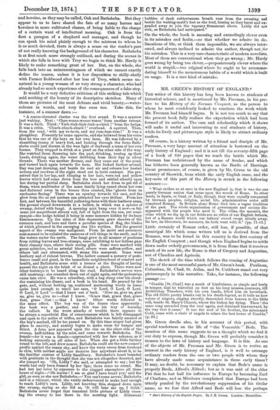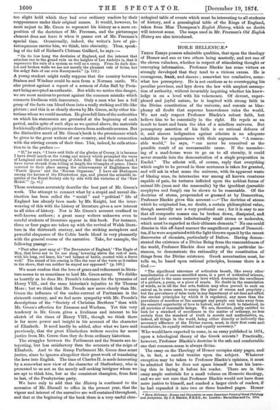MR. GREEN'S HISTORY OF ENGLAND.* Tnz writer of this history
has long been known to students of historical science, and is mentioned by Mr. Freeman, in his pre- face to his History of the Norman Conquest, as the person to whom he most confidently looked to continue the work which Mr. Freeman had himself begun. It is not too much to say that the present book fully realises the expectation which had been formed of its author. The care and scholarship which it shows will make it useful and interesting to real students of history, while its lively and picturesque style is likely to attract ordinary readers.
Of course, in a history written by a friend and disciple of Mr. Freeman, a very large amount of attention is bestowed on the early history of England ; and it is not till the seventy-fifth page of a book of 820 pages that we reach the battle which Mr. Freeman has rechristened by the name of Senlac, and which has hitherto been generally known as the Battle of Hastings. Great prominence, of course, is given by Mr. Green to the old country of Sleswick, from which the early English came, and the key-note of this part of the History is struck in the following sentence :-
" What strikes us at once in the now England is, that it was the one purely German nation that arose upon the wreck of Rome. In other lands, in Spain, or Gaul, or Italy, though they wore equally conquered by German peoples, religion, social life, administrative order still remained Roman. In Britain alone Rome died into a vague tradition of the past. The whole organisation of government and society dis- appeared with the people who used it. The villas, the mosaics, the coins which we dig up in our fields are no relics of our English fathers, but of a Roman world which our fathers' sword swept utterly away. Its law, its literature, its manners, its faith went with it." (pp. 11-12.)
Little certainly of Roman order, still less, if possible, of that municipal life which some writers tell us is derived from the Romans, was to be found in this country in the first century of the English Conquest ; and though when England begins to settle down under orderly governments, it is from Rome that it receives much of its new life, the Rome is that of Gregory and Augustine, not of Claudius and Agricola.
The sketch of the time which follows the coming of Augustine is one of the most successful parts of Mr. Green's book. Pauline, Columban, St. Chad, St. Aidan, and St. Cuthbert stand out very
picturesquely in this narrative. Take, for instance, the following passage :-- “Ceadda [St. Chad] was a monk of Lindisfarne, so simple and lowly in temper, that he travelled on foot on his long mission-journeys, till Archbishop Theodore, with his own hands, lifted him on horseback. The old Celtic poetry breaks out in his death-legend, as it tells us how voices of singers, singing sweetly, descended from heaven to the little cell, beside St. Mary's Church, where the bishop lay dying. Then the same song ascended from the roof again, and returned heavenward, by the way that it came.' It was the soul of his brother, the missionary
Cedd, come with a choir of angels to solace the last hours of Ceadda." (p. 24.)
Mr. Green dwells also, in his account of this period, with special tenderness on the life of "the Venerable" Bede. The mention of this name suggests to us a thought which we feel it our duty to express, though Mr. Green will probably consider it treason to the laws of history and language. It is this. As one of the objects of Mr. Freeman and Mr. Green is to revive. an interest in the early history of England, is it well to estrange ordinary readers from the one or two people with whom they have already made some acquaintance in those early times? It may, no doubt, be necessary to explain that Bede's name is properly Bmda, Alfred's 1Elfred ; but as it was said of the elder Pitt that he lost half his influence in Europe by becoming Earl of Chatham, and as Mirabeau complained that Europe had been utterly puzzled by the revolutionary suppression of his titular name, so we fear that Alfred and Bede will lose the perhaps
• ShOrg History of the English People. By J. E. Green. London: Macmillan.
too slight hold which they had over ordinary readers by their reappearance under their original names. It would, however, be most unjust to Mr. Green to represent his history as a mere ex- position of the doctrines of Mr. Freeman, and the picturesque element does not leave it when it passes out of Mr. Freeman's special time. Occasionally, indeed, the writer's love of pic- turesqueness carries him, we think, into obscurity. Thus, speak- ing of the fall of Richard's Château Gaillard, he says :—
" On its loss hung the destinies of England, and the interest that attaches one to the grand ruin on the heights of Les Andelys is, that it represents the ruin of a system as well as a camp. From its dark don- jon and broken walls we see not merely the pleasant vale of Seine, but the sedgy flats of our own Runnymede." (p. 112.) A young student might really suppose that the country between Staines and Windsor could be seen from a Norman castle. We also protest against a report of a sermon of John Ball by Frois- sart being accepted as authentic. But while we notice this danger, we are most anxious to protest against the common mistake which connects liveliness with inaccuracy. Only a man who has a full grasp of the facts can blend them into a really striking and life-like picture ; and this is as clearly shown by Mr. Green, as by other his- torians whom we could mention. He gives full lists of the authorities on which his statements are grounded at the beginning of each period, and in spite of such slips as we quoted above, the materials for his really effective pictures are drawn from authentic sources. But the distinctive merit of Mr. Green'sbook is the prominence which he gives to the great writers of our country, and their connection with the stirring events of their time. '1 his, indeed, he calls atten- tion to in the preface :— " If," he says, "I have said little of the glories of Cressy, it is because I have dwelt much on the wrong and misery which prompted the verse of Longland and the preaching of John Ball. But on the other hand, I lave never shrunk from telling at length the triumphs of peace. I have restored to their place among the achievements of Englishmen the 'Faerie Queen' and the Novnm Organum.' I have set Shak spore among the heroes of the Elizabethan age, and placed the scientific in- quiries of the Royal Society side by side with the victories of the 'New Model." (p. vi.) These sentences accurately describe the best part of Mr. Green's work. The attempt to connect what by a stupid and unreal dis- tinction has been called the " social " and " political " life of England has already been made by Mr. Knight, but the inter- weaving of this with the history of literature gives a new interest to all sides of history. Nor is Mr. Green's account confined to well-known authors ; a great many writers unknown even to careful students of literature appear in this book. For instance, three or four pages are taken up with the revival of Welsh litera- ture in the thirteenth century, and the striking metaphors and powerful eloquence of the Celtic bards blend in very pleasantly with the general course of the narrative. Take, for example, the following passage :— "Poet after poet sang of The Devastator of England," The Eagle of Men, that loves not to lie nor sleep,' towering above the rest of men, with his long, red lance, his 'red helmet of battle, crested with a fierce wolf.' The sound of his coming is like the roar of the wave as it rushes to the shore, that can neither be stayed nor appeased." (p. 160.)
We must confess that the love of grace and refinement in litera- ture seems to us sometimes to lead Mr. Green astray. We dislike as heartily as he does Mr. Froude's tolerance for the tyrannies of Henry VIII., and the same historian's injustice to Sir Thomas More ; but we think that Mr. Froude saw more clearly than Mr. Green the influence of the under-current of Puritanism in the sixteenth century, and we feel more sympathy with Mr. Froude's descriptions of the "Society of Christian Brethren " than with Mr. Green's affection for Erasmus and Warham. Yet this very tendency in Mr. Green gives a liveliness and interest to his sketch of the times of Henry VIII., though we think there is far more power and insight in his account of the character of Elizabeth. It need hardly be added, after what we have said previously, that the great Elizabethan writers receive far more justice from Mr. Green than they do from ordinary historians.
The struggles between the Parliament and the Stuarts are in- teresting, but less satisfactory than the accounts of the reign of Elizabeth. And to the Rump Parliament Mr. Green does scant justice, since he ignores altogether their great work of translating the laws into English. The time of Charles EL is made interesting by a somewhat new view of the character of Shaftesbury, who is presented to us not as the merely self-seeking intriguer whom we are apt to think him, but as the consistent champion, from first to last, of the Presbyterian party.
We have only to add that the History is continued to the accession of Mr. Disraeli to office in the present year, that the vigour and interest of the narrative are well sustained throughout, and that at the beginning of the book there is a very useful chro- nological table of events which must be interesting to all students of history, and a genealogical table of the Kings of England, taken from Miss Thompson's English History, which no doubt will interest some. The maps used in Mr. Freeman's Old English History are also introduced.







































 Previous page
Previous page